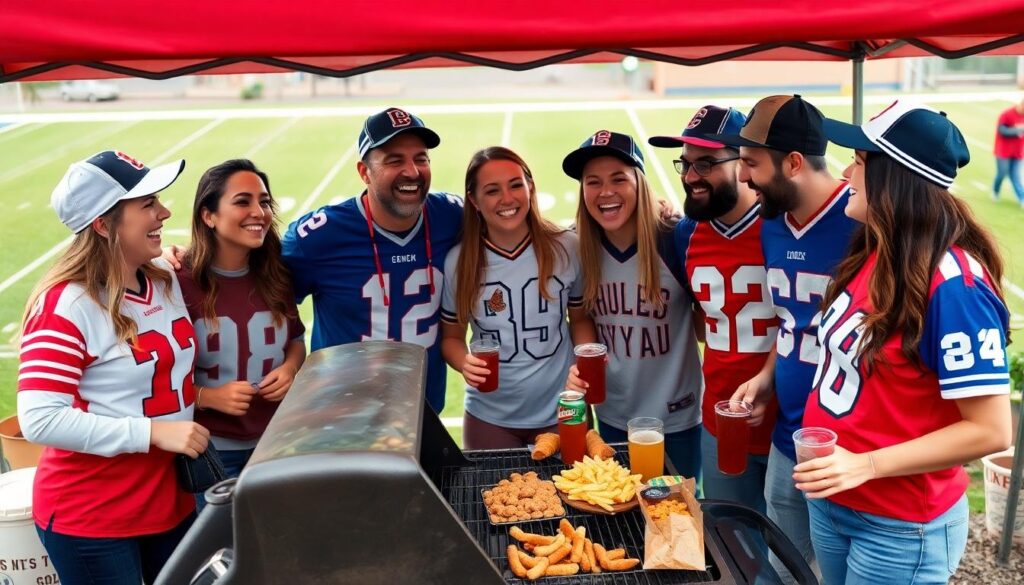Looking to score big with your football-loving friends? We’ve tackled the field of humor to bring you some hilariously dirty football puns that’ll have everyone rolling on the turf with laughter. These aren’t your average Sunday afternoon jokes—they’re the cheeky, slightly risqué one-liners that add an extra thrill to game day conversations.
Whether you’re hosting a tailgate party or just want to spice up your football banter, our collection of dirty football puns is guaranteed to be a touchdown. We’ve carefully selected puns that play on football terminology in ways that’ll make even the most serious fans blush. From tight ends to wide receivers, these wordplays take advantage of football’s naturally suggestive vocabulary for maximum laughs.
10 Dirty Football Puns That Will Have You Scoring All Night Long
- “I’d like to enter your red zone” – Football’s red zone takes on a whole new meaning with this suggestive pun that’s perfect for flirting with fellow fans who understand the scoring opportunity reference.
- “Want to see my tight end?” – Playing on the position name, this cheeky line never fails to get a reaction at football parties when delivered with the right timing and a playful wink.
- “I’m great at handling balls” – This classic double entendre works especially well when discussing quarterback skills or special teams performance while letting your risqué humor shine through.
- “Let me show you my quarterback sneak” – Referencing this surprise offensive play creates an instantly playful innuendo that suggests you’ve got some unexpected moves of your own.
- “Ready for some full contact?” – Football’s physical nature provides the perfect setup for this suggestive line that hints at activities beyond the gridiron.
- “Care to practice your wide receiver stance?” – Position-based puns like this one create immediate football connections while suggesting something more intimate than just route running.
- “I’d love to tackle you in the backfield” – Defensive terminology works perfectly for flirtatious banter, especially when delivered with confidence to someone who appreciates football wordplay.
- “Want to see my goal-line penetration?” – This football strategy reference transforms into an unmistakable double meaning that’s sure to raise eyebrows and possibly temperatures.
- “I’ve been told I have great hands for tight coverage” – Combining defensive back skills with suggestive undertones creates a perfectly balanced football pun for adults who appreciate the sport’s terminology.
- “How about we go deep tonight?” – The long passing play concept provides an easy setup for this straightforward yet effective pun that works in almost any football conversation when you’re looking to score off the field.
The Tight End: Double Entendres That Play Both Ways

The term “tight end” naturally lends itself to comedic potential thanks to its anatomical connotations. Football terminology creates a perfect playground for double entendres that work on multiple levels. Phrases like “finding his tight end” or “penetration in the backfield” describe legitimate football strategies while simultaneously evoking unintended innuendo. These terms have become staples in fan discussions and humor forums as classic examples of accidental double meanings.
Rear Formation Jokes
Football commentary frequently includes phrases that sound innocent in context but take on new meaning when isolated. Terms like “stretching to get it in” or “banging it in” during scoring plays gain their humor from suggestive phrasing. According to a 2015 analysis from Dear Sports Fan, expressions such as “gap discipline” and “getting stripped” become unintentionally risqué when removed from their football context. Play-by-play announcements involving “hit the hole” or “illegal touching” further blur the line between technical jargon and cheeky wordplay. Fans often collect these moments, sharing them across social media platforms whenever announcers unknowingly create comedic gold during live broadcasts.
Receiving From Behind Quips
Strategic positioning in football creates fertile ground for suggestive wordplay. Terms like “sack” and “fumble recovery” inspire puns focused on physical positioning that work on multiple levels. Recent examples from Punsify’s 2025 collection showcase oxymoronic wordplay such as “clean slate, dirty cleats” and “friendly fire,” which juxtapose opposing concepts for comedic effect. Other phrases like “roughing the passer: a gentle touch gone wrong” mock football’s inherently violent terminology through ironic contrasts. The humor works because it relies on linguistic duality, where innocent football terms like “touchdown dance-off” can be reframed with suggestive undertones such as “the real game is off the field.” Fan communities continue to evolve these puns alongside the sport’s ever-growing lexicon, as evidenced by long-running forum threads dating back to 2005.
Going Deep: Penetrating the Defense With Wordplay

Football terminology naturally lends itself to suggestive wordplay. Let’s explore some of the cheekier puns that leverage defensive and offensive language from the gridiron.
Breaking Through the Line Puns
Football’s defensive terminology creates perfect opportunities for playful innuendo. “Tackling” life’s challenges takes on a whole new meaning when delivered with a knowing wink. Players who excel at “sacking” the quarterback provide ample material for clever wordplay—much like not wanting to get “sacked” in chess because it’s simply too intense. Even the term “block” can lead to cheesy but entertaining puns, such as complimenting someone on “a Gouda block” when they prevent an advance. These line-focused puns use fundamental football actions while giving them just enough suggestive context to make friends laugh during game day.
Long Bomb Innuendos
The vertical passing game offers rich territory for football innuendos. “Passing plays” aren’t just for moving the ball downfield—they can refer to smoothly “passing the salt” with quarterback-like finesse across the dinner table. When someone reaches the “end zone,” their celebration dance becomes a touchdown for choreography that deserves replay. Long bombs and deep routes naturally suggest distance and connection, making them perfect metaphors for relationships and romantic pursuits. Football fans particularly appreciate these double-meaning phrases that celebrate both their favorite sport and life’s more intimate moments, creating inside jokes that only fellow enthusiasts fully understand.
Handling the Ball: When Touch Football Gets Touchy

Ball handling terminology in football creates some of the sport’s most unintentionally hilarious innuendos. These phrases describe essential gameplay mechanics but often prompt chuckles due to their suggestive secondary meanings.
Fumbling in the Backfield Jokes
Football’s vocabulary around ball security provides endless material for cheeky wordplay. “Fumbling in the backfield” technically refers to a player dropping the ball behind the line of scrimmage, but fans have transformed this mishap into comedy gold. Players who “can’t hold onto their balls” become instant targets for good-natured ribbing among spectators. Creative fans often quip about “protection problems” when discussing fumble-prone running backs. These jokes capitalize on the natural tension between professional sports commentary and unintended double meanings. Even broadcasters occasionally stumble into these verbal traps, creating memorable moments when they earnestly discuss a player’s “fumbling issues” or “ball security problems” without recognizing the potential for misinterpretation.
Firm Grip Techniques
Maintaining “firm grip” on the football represents fundamental skill development, yet this innocuous coaching phrase ranks among the most frequently punned terms in the sport’s lexicon. Coaches stress the importance of “two hands on the ball” when running through traffic, unwittingly contributing to the double entendre catalog. Ball-carrying techniques like the “high and tight” method have spawned countless jokes among fans who appreciate the unintentional humor. Training drills specifically designed to improve grip strength give rise to expressions like “getting a better feel for the ball” that sound perfectly normal in context but prompt smirks when isolated. Players who demonstrate exceptional ball security earn descriptions such as having “vice-like hands” or “never letting go once they get their hands on it” – phrases that fit seamlessly into both football analysis and the area of suggestive humor.
Wide Receivers: Opening Up the Field of Play

Wide receivers provide some of the most fertile ground for football puns with their unique role on the field. Their job of getting open and creating space offers plenty of opportunities for creative wordplay that’s sure to score with fellow fans.
Spreading the Defense Puns
Wide receivers are truly “hooked” on catching those passes, and their ability to spread the defense creates perfect opportunities for suggestive humor. Football fields become playgrounds where wide receivers “spread out” and showcase their remarkable skills in ways that naturally lend themselves to cheeky innuendo. Players who excel at creating separation are often described as “getting behind” the defense—a phrase that works equally well for football analysis and flirtatious banter. Receivers who can “stretch the field” vertically give quarterbacks more options and joke-tellers more ammunition for their arsenal of puns.
Getting Open in the End Zone
When wide receivers score, it’s definitely a “catch” for both laughter and points on the scoreboard. They expertly “route” their opponents on the field while simultaneously “routing” their humor directly into the end zone for maximum impact. Wide receivers are always “open” to making a play—and a joke—especially when it involves celebrating in the end zone. The phrase “wide open in the back of the end zone” takes on an entirely different meaning when removed from its football context. Players who excel at “finding the soft spots” in zone coverage provide announcers with terminology that fans can’t help but snicker at during game broadcasts.
Scoring Position: Touchdown Celebrations With a Twist

Touchdown celebrations have evolved into an art form filled with opportunities for cheeky wordplay and suggestive humor. We’ve compiled some of the most playful ways football fans and players turn these celebratory moments into memorable puns.
Spike It When You Like It
The ball spike has become a canvas for some of football’s most suggestive puns. “Spike it when you like it” perfectly captures the enthusiasm players show after scoring, with a flirtatious undertone that fans can’t help but appreciate. Players known for particularly aggressive spikes often earn nicknames like “Touchdown Troublemakers” for their passionate displays of victory. Football commentators sometimes accidentally contribute to the humor when they describe a player “thrusting the ball into the ground with power,” creating unintentional double entendres. Fans regularly share clips of these moments on social media with captions like “I love the rough plays,” adding another layer of playful interpretation to these celebratory traditions.
End Zone Dance Euphemisms
End zone celebrations have spawned an entire vocabulary of suggestive terminology that delights fans nationwide. “End Zone Escapades” refers to those choreographed dances that often push the boundaries of what referees will tolerate. Players who frequently find themselves in penalty trouble earn the title “Penalty Box Bandits” from commentators and fans alike. Creative phrases like “That touchdown was a real mess” have become standard fare among supporters who enjoy the lighter side of football banter. “Filthy Fielders” celebrates those athletes who aren’t afraid to get dirty while making plays, with the term carrying a playful dual meaning that football enthusiasts immediately recognize. These euphemisms create an exclusive language among fans who understand the hidden meanings behind seemingly innocent football terminology.
Personal Fouls: When the Game Gets Physical

Football terminology frequently leads to unintended double entendres, especially when discussing physical aspects of the game. These phrases create some of the most hilarious moments for fans listening to commentary.
Unnecessary Roughness Jokes
Unnecessary roughness penalties spark many puns that highlight the physical nature of football. “He rams it in for a quick score” innocently describes a forceful touchdown attempt, yet carries obvious suggestive undertones. The penalty “roughing the passer” officially punishes defenders who hit quarterbacks after throwing, but fans often joke it’s just a “gentle touch gone wrong.” We’ve all heard commentators discuss “friendly fire” when describing accidental contact between teammates, creating perfect opportunities for eyebrow-raising among viewers familiar with the double meaning. These phrases showcase how legitimate football terminology transforms into comedy gold when pulled from context.
Illegal Contact Lines
The position of “tight end” stands as perhaps the most frequently highlighted term for its double meaning in football vocabulary. Commentators routinely describe how players “found the hole and exploded through it” when discussing successful running plays, completely unaware of how it sounds to casual listeners. Phrases like “penetration in the backfield” technically refer to defensive players breaking through offensive lines but consistently rank among fans’ favorite accidental innuendos. “Illegal use of hands” penalties officially punish improper blocking techniques, yet the terminology consistently draws chuckles from spectators. Announcers who describe players “getting stripped” of the ball unintentionally create moments of humor that spread quickly through social media and fan forums, adding an extra layer of entertainment to game day.
Fourth Down and Inches: Size Matters in Football

In football, few situations create more tension than fourth down and inches. These nail-biting moments where every fraction of an inch counts create the perfect backdrop for some of the sport’s most playful wordplay.
Short Yardage Situation Puns
When it comes to short yardage situations, football fans know that size truly matters on the field. “Fourth Down and Inches” becomes more than just a critical game situation—it’s a golden opportunity for cheeky wordplay. Football commentators often emphasize how “getting just a few inches” can make all the difference between victory and defeat. Fans have crafted gems like “It’s all about how you use those inches” when discussing a team’s short-yardage strategy. The term “Goal-den Moments” celebrates those crucial plays where scoring depends on minimal distance, highlighting both achievement and spatial precision. “Footfall” puns showcase players dancing around defenders with nimble footwork, suggesting that sometimes it’s not about size but how cleverly you move in tight spaces.
Measuring the Chains Jokes
Nothing creates suspense quite like officials bringing out the chains to measure a crucial fourth down attempt. “Inch-ing Closer” becomes a favorite phrase among fans watching their team gradually advance toward the goal line, reminding us that life—like football—is truly a game where every small measurement counts. The term “Tight Spot” takes on multiple meanings when the ball carrier squeezes through a narrow opening in the defense to secure those precious few inches. Commentators unintentionally add fuel to the fire with phrases like “He just barely got enough penetration to move the chains” or “That’s the tightest measurement we’ve seen all day.” These measuring moments create natural tension that transforms ordinary football terminology into comedy gold for fans who appreciate the double meaning behind seemingly innocent remarks about inches, tight spots, and chain measurements.
The Two-Minute Drill: Quick and Dirty Plays

When games come down to the wire, football teams pull out their most intense offensive strategies. The two-minute drill represents one of football’s most exciting and tension-filled moments, where teams must execute rapidly and efficiently.
Hurry-Up Offense Innuendos
The hurry-up offense creates a goldmine of unintentional double entendres that fans can’t help but snicker at. Players “getting it in quickly” refers to legitimate offensive urgency but never fails to raise eyebrows among those with playful minds. Football commentators regularly describe teams as “ramming it down the field” or “pushing it in fast” when discussing these high-pressure situations. Coaches might instruct their players to “go hard and don’t stop,” a perfectly innocent direction that sounds decidedly less innocent outside the huddle. Teams executing these plays often create “quick penetration” through defensive lines, demonstrating how standard football terminology transforms into cheeky wordplay during these fast-paced drives.
Fast and Hard Execution
The intensity of two-minute drills generates some of football’s most suggestive commentary. Broadcasters frequently describe players “going all out” or “giving everything they’ve got” as the clock winds down. Quarterbacks must make “quick releases” to avoid defensive pressure, while receivers need to “get open fast” to complete passes efficiently. Coaches praise their teams for “executing with urgency” when plays unfold successfully in these high-stakes moments. Analysts might comment on an offense’s ability to “pound it through tight spots” when discussing successful runs during hurry-up situations. Players who excel in these scenarios earn reputations for “performing when it matters most,” showcasing how the legitimate language of football strategy naturally lends itself to playful interpretation among fans with a sense of humor.
Postgame Analysis: Locker Room Talk That Stays on the Field

Locker room culture serves as the breeding ground for some of football’s most memorable inside jokes and banter. These private environments foster team bonding through humor that often remains exclusive to players and staff.
Shower Scene Puns
Shower scenes in athletic facilities create a unique backdrop for football-related humor that rarely makes it to public forums. Players often exchange quips like “Working on your deep ball technique?” or “Showing off your rushing ability?” while in these private spaces. Shower settings naturally lend themselves to wordplay that combines cleanliness with football terminology, creating an environment where teammates can build camaraderie through shared humor. Research indicates these informal moments significantly contribute to team cohesion and relationship building among players, even when the content might raise eyebrows outside the locker room context.
Performance Evaluation Jokes
Performance evaluation jokes function as essential team-building tools, allowing players to process both victories and defeats through humor. Athletes regularly tease each other with lines like “Your receiving skills are better than your dating game” or “You tackle opponents better than you tackle life problems.” These lighthearted jabs help maintain positive team dynamics while alleviating the pressure of high-stakes competition. Team leaders often deploy strategic humor to address performance issues without creating tension, using lines that would seem inappropriate in formal settings. Studies on sports psychology highlight how this form of joking serves multiple purposes – from stress relief to reinforcing team hierarchy to creating psychological safety among teammates who face intense public scrutiny together.
Conclusion: Blowing the Whistle on Our Dirty Football Puns
We’ve tossed around quite the playbook of cheeky football puns that are sure to score at your next game day gathering. These double entendres leverage the natural terminology of the sport to create moments of laughter and lighthearted flirtation among fans.
From red zones to tight ends fumbling balls we’ve covered the field with wordplay that makes football even more entertaining. Whether you’re tailgating or watching from home these puns add an extra layer of fun to America’s favorite contact sport.
So next time you hear a commentator mention “penetration in the backfield” or see players celebrating in the end zone remember there’s always room for a little adult humor in our football conversations. Game on!
Frequently Asked Questions
Why are football puns so popular among fans?
Football puns are popular because they create an instant connection between fans who understand the sport’s terminology. These wordplays add a layer of humor to game day conversations, making social gatherings more enjoyable. The shared language of football naturally lends itself to creative wordplay, and fans appreciate clever twists on familiar terms that can break the ice or lighten the mood during tense game moments.
Are these football puns appropriate for all audiences?
No, many of these puns contain suggestive innuendo and double entendres that make them more suitable for adult audiences. While some football puns are family-friendly, the ones highlighted in this article intentionally play with risqué interpretations of football terminology. Consider your audience carefully before sharing these at events where children might be present or in professional settings.
Where do fans typically share these types of football puns?
These puns thrive at tailgate parties, sports bars, fantasy football gatherings, and adult game day parties. Social media platforms like Twitter and Reddit have dedicated threads where fans share and evolve these jokes. Text message groups among friends during games are another popular venue where these puns circulate and gain new variations based on live game commentary.
Which football terms most commonly become puns?
Terms related to positions (tight end, wide receiver), actions (penetration, sacking), ball handling terminology (fumbling, firm grip), and scoring plays (getting it in, touchdown celebrations) generate the most puns. Phrases used during critical moments like “fourth down and inches” or the “two-minute drill” are also frequent sources of wordplay due to their inherent tension and suggestive potential.
Do NFL commentators realize when they’re making accidental innuendos?
Most commentators are focused on providing technical analysis and don’t intentionally create double entendres. However, football terminology naturally contains phrases that can sound suggestive when isolated from context. Commentators occasionally recognize an unintended innuendo after saying it, sometimes leading to awkward pauses or colleagues suppressing laughter during broadcasts.
How do these puns affect team dynamics in real locker rooms?
Locker room humor, including these puns, often serves as a bonding mechanism for players. This banter helps relieve pressure, process victories and defeats, and build camaraderie among teammates. While potentially inappropriate outside these private settings, such jokes create a shared language and psychological safety within the team environment, helping players navigate the high-pressure world of professional sports.
Can football puns help someone understand the sport better?
Surprisingly, yes. Engaging with football puns requires understanding the terminology and concepts they reference. For newcomers to the sport, these wordplays can act as memorable hooks for learning rules, positions, and strategies. The humor helps cement football concepts in memory, though learners should pair this with actual game watching and proper explanation of the sport’s fundamentals.
What makes a football pun effective versus just crude?
Effective football puns balance clever wordplay with relevance to the actual sport. The best puns work on multiple levels—they accurately reference legitimate football concepts while smoothly transitioning to the suggestive meaning. Simply using crude language without the football connection fails to create the spark of recognition that makes these puns entertaining to knowledgeable fans.







